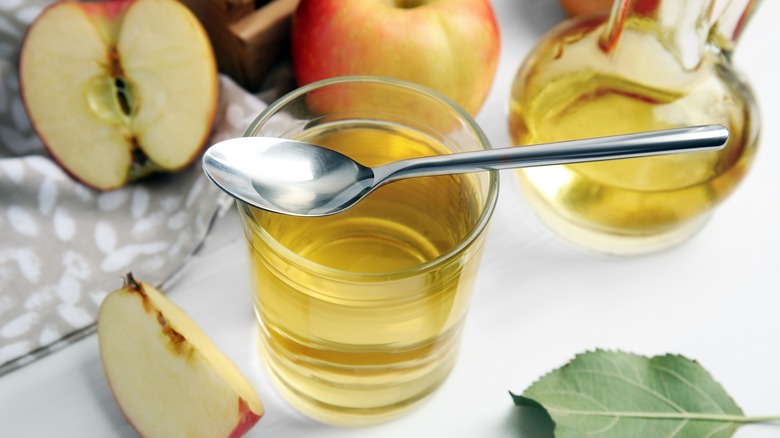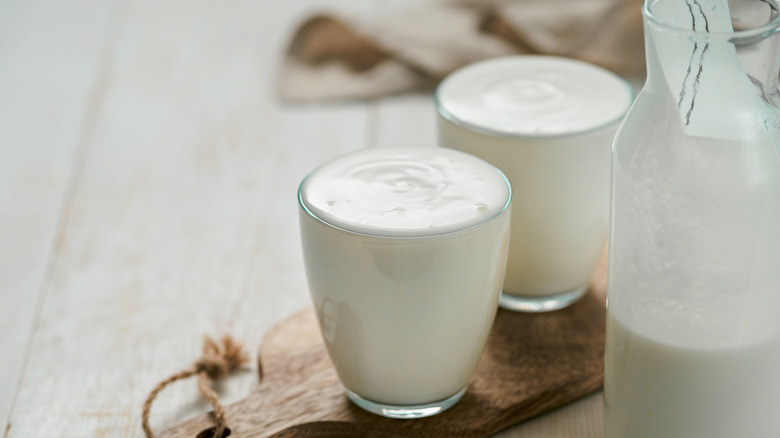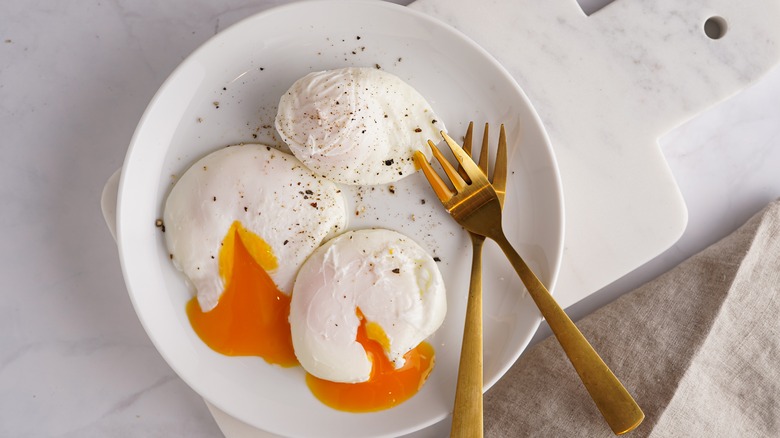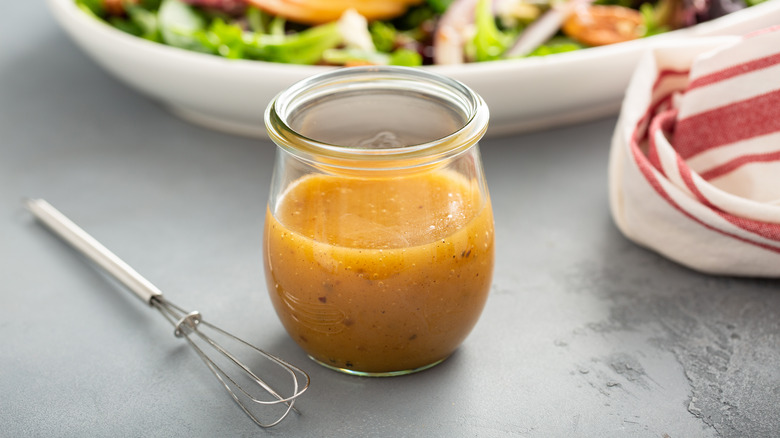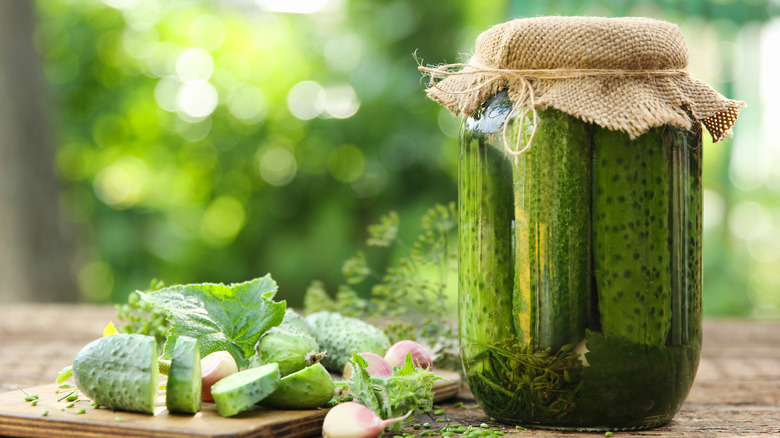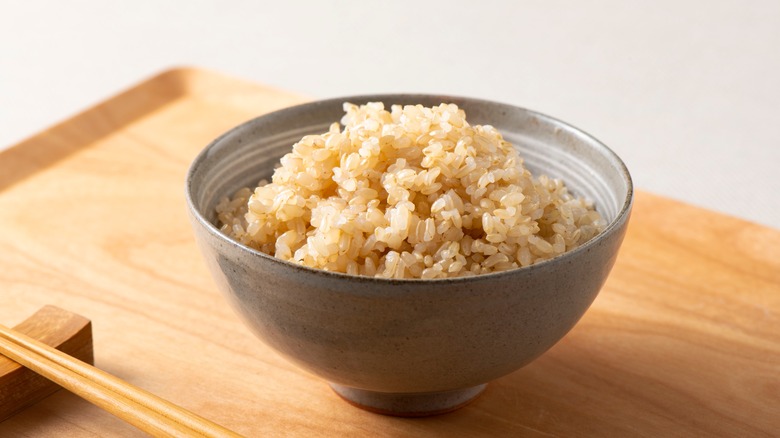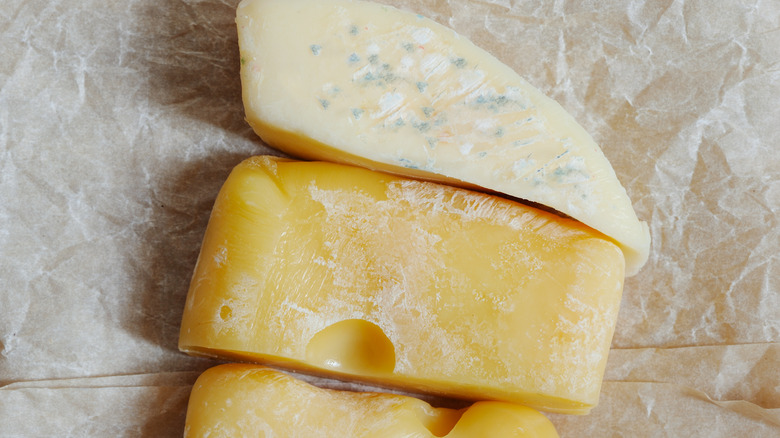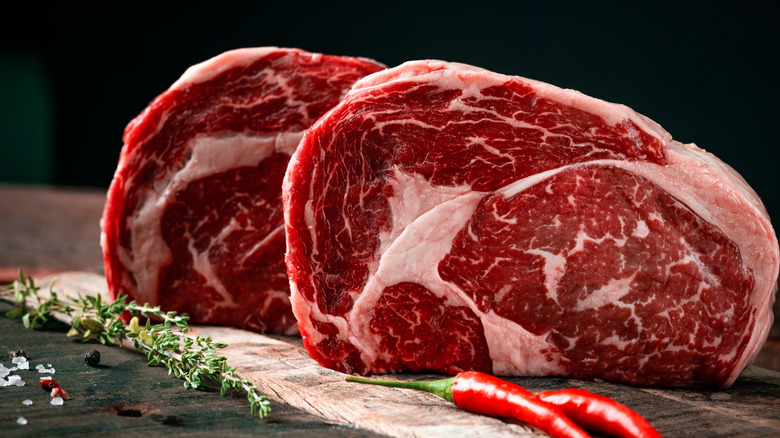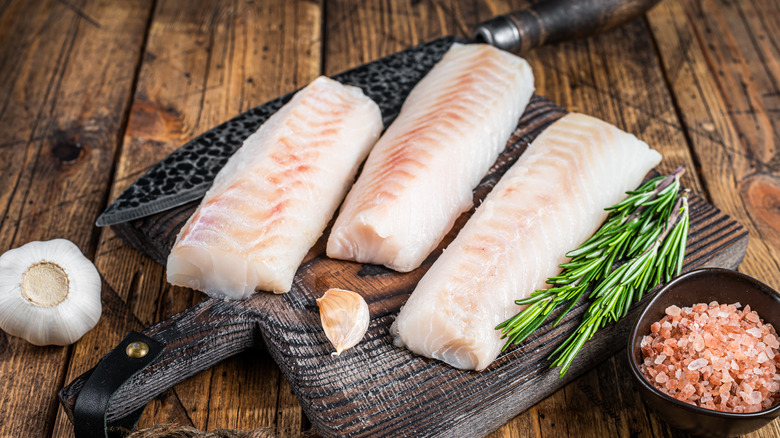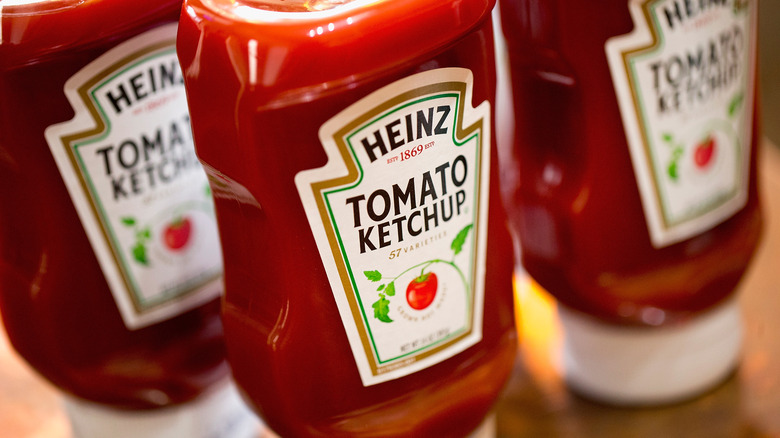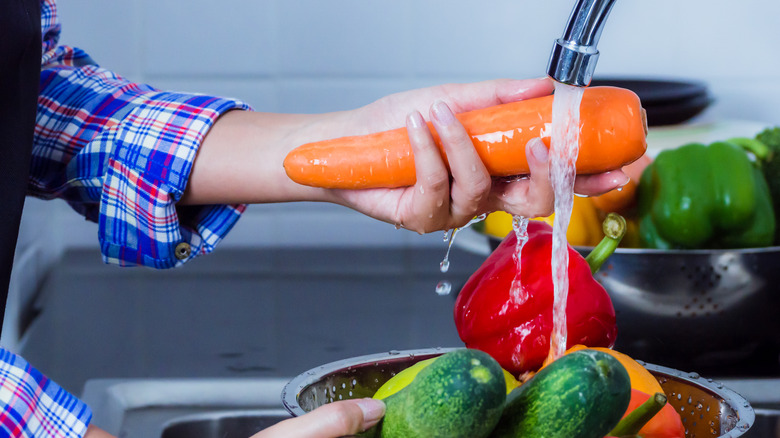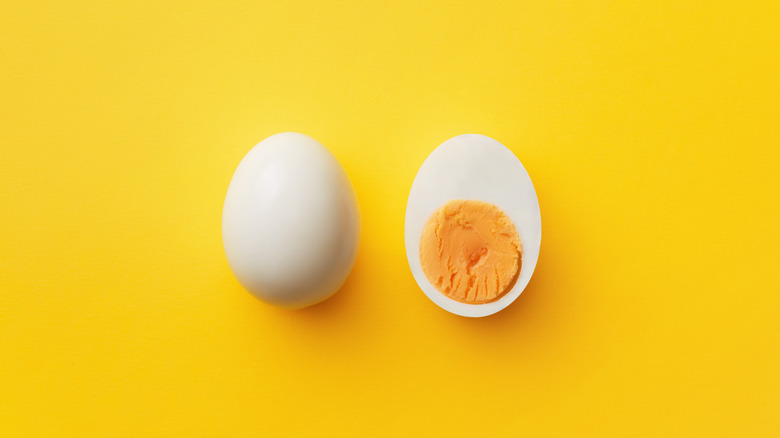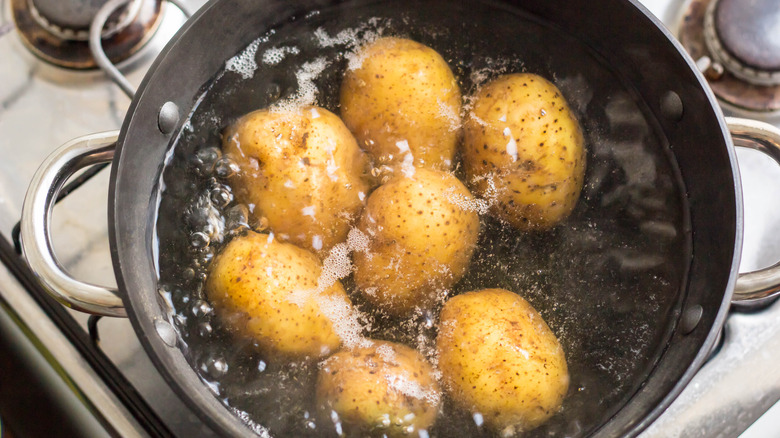Vinegar Cooking Hacks You'll Wish You Knew Sooner
There are some kitchen staples that most of us have lying around in the fridge, the pantry, or on the countertop. These staples aren't the kinds of ingredients you buy for a specific recipe or cooking project. Rather, you use them in a wide variety of dishes for many varied uses. However, there are few ingredients that are more essential to a kitchen than vinegar. It seems like this ubiquitous ingredient is everywhere, and it's no wonder: It works for such a wide variety of uses. Whether you have white distilled vinegar, apple cider vinegar, or balsamic stashed in your pantry, there's a good chance that you use the stuff on the regular.
But most people don't realize how valuable vinegar really is. It has so many different uses that you're almost definitely missing out on some of them. And while, yes, vinegar can be used for cleaning purposes, it can also seriously come in handy when you're cooking as well.
We're here to help you make sure you make good use of the vinegar you have sitting around the house. With these simple and easy cooking hacks, you'll find that your bottle of vinegar becomes even more indispensable in your cooking routine.
Substitute a vinegar mixture for buttermilk
Have you ever had a recipe that calls for buttermilk only to realize that you don't any? It can be a huge bummer, especially if you're in a hurry to throw a meal together. But if you have some vinegar lying around, you may just be in luck. According to Tastes Better From Scratch, you can use a vinegar mixture to replace buttermilk in just about any recipe.
It's relatively simple to make a buttermilk substitution at home. All you're going to need is some white distilled vinegar (other varieties — especially balsamic — are not going to work here) and some milk. If you're trying to make a single cup of "buttermilk," you'll start with a single tablespoon of white vinegar in a measuring cup. Then, pour enough milk into the measuring cup to equal a full cup total. Stir the two ingredients together, and then give the mixture about five minutes to come together. Once your five minutes are up, you'll have the perfect buttermilk replacement. This hack is so easy, that we may never even bother with buying real buttermilk again.
Use vinegar for perfectly poached eggs
Poached eggs are one of life's truest delights. It's just a healthier version of a fried egg, and despite the lack of crispy edges, it's an egg preparation that we come back to time and time again. But, if you're like us, poaching an egg can be challenging at best and downright frustrating at worst. If you have problems keeping the egg white together once you drop the egg into the water, you're not alone. Luckily, though, vinegar can help with that, according to Downshiftology.
All you're going to do is bring your water to cook your poached eggs to a boil, then add some vinegar to the water. You'll want to use about a tablespoon of the stuff if you're cooking your egg in a small pan. Choose a lighter-colored vinegar if you want to prevent the vinegar from dyeing your egg — while it probably won't taste bad, you may want to avoid the weird appearance that could result from a darker-colored vinegar.
So, what exactly does vinegar do? It helps the egg whites stick together, so you're not left with a mess of an egg that you have to extract from the water with a slotted spoon. And don't worry — if you just use a small splash of vinegar, you're not going to have to worry about tasting the vinegar in your eggs.
Add acidity to a salad dressing
One of the most basic hacks for cooking with vinegar? Adding some zippy acidity to your salad dressings. An oil-based dressing can be delicious, but all that fattiness can be overwhelming on your palate, especially if you're eating a salad that should taste light and fresh. But you don't need to leave out the olive oil completely — just add some vinegar to the mix. Vinegar can cut through the rich fattiness that's so prevalent in many salad dressing recipes (and store-bought salad dressings), and it adds a refreshing quality that will make you want to ask for seconds of those veggies.
While vinegar is delicious on a veggie-based salad, that doesn't mean you can't use it for other types of salad as well. We love a vinegar-heavy dressing for a pasta salad because the pasta can soak up all of that vinegar-y goodness. It also makes a lovely addition to chicken salads and potato salads, which are often heavy on fatty dressing. Experiment with your favorite salad recipes, and you'll see what a difference an addition of vinegar can make.
Make pickled veggies with vinegar
So, you want to pickle some veggies. Whether you're trying to preserve your garden-fresh produce so you can use it later in the year or you just want to try your hand at a new preserving method, pickling is a fun project that can make for some delicious, acidic veggies that are perfect for tucking into when you want more freshness in your life. However, for many home cooks, the idea of trying to pickle with a salt solution is just too intimidating. Luckily, though, you can also pickle your veggies with vinegar, and it's an easy process.
Per Preserve & Pickle, vinegar works by preventing bacterial growth and extending a food's shelf life. That being said, you need to make sure you're choosing the right kind of vinegar. You should be looking for vinegar that boasts an acidity of 5% or higher — without this intense acidity, bacteria will still be able to grow. For most veggies you want to pickle, distilled white vinegar is your best bet since it doesn't impart much of a flavor to the food. But for those who want more flavor to their pickled veggies, malt vinegar can also be a solid choice. This is an especially good option if you're pickling onions, one of our all-time favorite pickled foods.
Get fluffier rice
Cooking rice truly is an art. If you don't know what you're doing, you could end up with crunchy, hard grains or a fluffy mess of rice mash that you won't want even want to bother tucking into. But if you struggle with making rice, you may be happy to find out that vinegar can help with the process. According to Sweet Peas and Saffron, adding vinegar to your cooking rice can be hugely beneficial. That's because the acid breaks down some of the starches in the rice, which in turn aids in the rice's absorption of the cooking liquid. That can lead to fluffier rice, and isn't that what all rice lovers truly want?
This vinegar hack works for all kinds of rice, but it can be especially helpful when you're working with brown rice. Brown rice can be difficult to cook thoroughly anyway, so with the addition of vinegar, you're ensuring that it fluffs up properly so you don't have to wait forever for it to cook. Who knew such a simple hack could make cooking rice so much easier?
Use it to preserve your cheese for longer
We've already covered the fact that pickling vegetables in vinegar can help slow the spoiling process. But did you know that it's not just for veggies? Vinegar can help preserve other foods in your kitchen as well. One great example is cheese. According to Thrifty Fun, vinegar slows mold growth, so if you're worried about your cheese going bad, you can use some vinegar to help it last longer.
The process is easy. First, just take your cheese out of the packaging it came in — it's usually wrapped in a plastic cling-style wrap. Then, dampen a paper towel with some vinegar. Distilled white vinegar is going to be your best bet here. Make sure the paper towel is moist, but avoid soaking it in vinegar. After all, you probably don't want it to affect the flavor of your cheese. Then, simply wrap the cheese in the damp paper towel, place it in a plastic zipped bag (or something similar), and put it back in your fridge. If you notice that the paper towel is drying out after a few days, repeat the process again so you're keeping that paper towel damp.
Using vinegar in this way will prevent your cheese from spoiling so fast, and it makes just save you some money in the process. After all, good cheese isn't cheap!
Tenderize your meat with vinegar
If there's one step that home cooks often forget when they're cooking meat, it's remembering to tenderize said meat. It's an easy step to skip, but without it, you may end up with a tougher cut of meat than you really want. Of course, you can always take that meat mallet out and start pounding away, but there is a better way: using vinegar. According to eHow, you can easily use vinegar to tenderize a steak. The same is true for other types of meat as well.
First, you're going to mix one part vinegar with two parts warm liquid (broth is usually your best bet). If you want to marinate the meat at the same time you're tenderizing it, simply add some spices and seasonings to the mixture. You can also use oil here if you want to impart some more fattiness into the cut. Then, poke some holes in your meat to allow that vinegar mixture to really get in there. Soak the meat in the mixture, and place it in the refrigerator for about two hours or until you're ready to cook.
Yes, this step does take some extra time, but when you see how tender and succulent is in the end, you'll realize that it's well worth those extra few hours it took.
Banish the fishy smell on your hands that comes with cooking seafood
Do you love cooking seafood as much as we do? There's something about making a delicious seafood dish at home that just feels special and celebratory. But there is one downside that people don't talk about enough; the fishy smell that lingers on your hands after you've handled raw fish. It's not the best smell in the world, and you probably won't want to continue with your day having to catch a whiff of Mahi Mahi anytime your hand brushes past your face. But what are you supposed to do if the soap and water just aren't cutting it?
As it turns out, you can use vinegar to get rid of that fishy smell, per My Backyard Life. All you have to do is mix some vinegar with lemon juice. You'll want to use around a cup of vinegar along with a ¼ cup of lemon juice. Then, add some dish soap to the mixture and let it sit there for about half an hour. After that 30 minutes are up, dip your hands into the mixture and start scrubbing. In a matter of minutes, you'll have gotten that fishy smell off of your hands easily.
Make your ketchup last longer with a dash of vinegar
We all want to make our grocery store purchases go further, especially when grocery prices are so high. That means that you'll want to avoid throwing away anything that you can still use. But sometimes, if a sauce gets stuck in a jar or its plastic packaging, it can be difficult to get it out. That's certainly the case when you've gotten down to your last bit of ketchup in a bottle. If you've already shaken it, trying to get the last drop of that red gloop, but it's still clinging to the bottom of the bottle, you may find that vinegar can help.
All you'll want to do is pour a bit of vinegar into the bottle of ketchup before you shake it up. That extra bit of liquid will catch the remaining bit of ketchup in the bottle. Ketchup already contains vinegar, so it shouldn't change the flavor too much, although it may help to balance out some of the intense sweetness that so many commercial kinds of ketchup are known for. By employing this hack, you can make sure you're not wasting a single drop of that ketchup.
Wash your produce with it
You probably already know you can clean things around your home with vinegar, but did you know that you can use it to wash your produce too? If you want to get rid of bacteria and make sure your fruits and veggies are as clean as possible, soaking them in a vinegar solution is a smart way to do so, according to Best Food Facts. To make your solution, you'll want to use three parts water to one part vinegar, and then soak your produce for about 10 minutes.
However, you'll want to make sure that you don't make your fruits and veggies dirtier in the process. If you're using the sink to wash your produce, then it's important to make sure that the sink is as clean as possible before washing your fruit in it — and that's especially true if you've used the sink to handle any meat recently. Otherwise, you may want to use a bowl instead of the sink.
Make your boiled eggs easier to peel with vinegar
We love a good hard-boiled egg — and we don't mind a jammy yolk either. But if you're well-acquainted with boiling eggs, then you know that peeling the shell off can be a tricky task, especially if you like your boiled eggs on the softer side. So, how can you make sure that the yolk falls off perfectly every time? You may be surprised to find out that vinegar can help with that. According to Wholesome Yum, adding vinegar to the water you're boiling your eggs in helps soften the shells, making them easier to peel. Adding salt to the water as well can also help make the shells easier to peel.
You can use either distilled white vinegar or apple cider vinegar for this process, but just keep in mind that you're not going to want to choose anything like balsamic vinegar since it could impart a less-than-desirable taste to your boiled eggs. Keep things simple, and you'll be amazed at how easy it is to peel your boiled eggs.
Boil your potatoes with vinegar to avoid mushiness
Love potatoes? There are so many different kinds to choose from when you go to the grocery store. Some potatoes, like the red variety, are waxy, and these potatoes hold their shape even after they've been boiled for quite some time. However, starchy potatoes, like russets, for example, don't hold their shape quite so well, which can leave you with a mushy mess.
But as it turns out, vinegar can actually help with this. Adding vinegar to the water you're boiling your potatoes in will ensure that they don't get mushy too quickly. This is because the vinegar forms a kind of crust on the surface of the potatoes, which helps them better keep their shape. And while you'll probably want to choose a vinegar that's more neutral in flavor for this, any vinegar will do.
Just add a dash of vinegar around halfway through the cooking process, and you'll see how much easier it is for your potatoes to hold their shape. Now get ready to make the best potato salad of your life.
